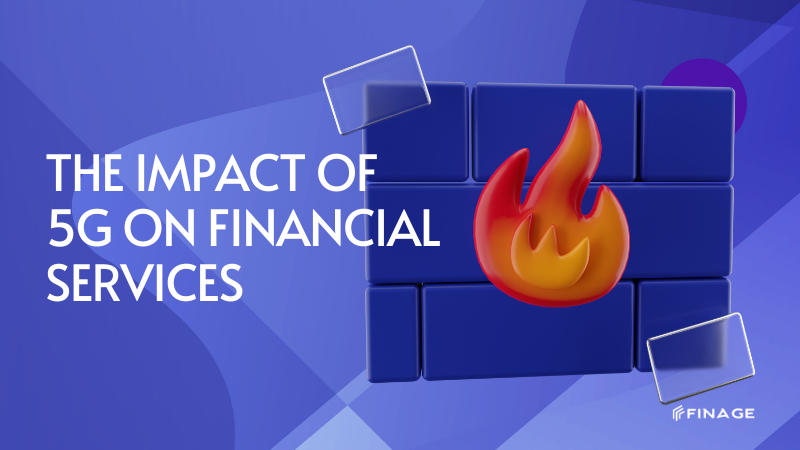The Impact of 5G on Financial Services
4 min read • March 15, 2024

Introduction
The imminent arrival of 5G technology heralds a transformative wave across diverse industries, and the financial services sector stands at the forefront of this revolution. With the advent of higher speeds, reduced latency, and amplified connectivity, 5G holds the promise of fundamentally reshaping the efficiency and accessibility of financial services. This blog endeavors to uncover the profound impact of 5G technology on the financial sector, spanning from revolutionizing mobile banking to revolutionizing algorithmic trading.
One of the significant areas where 5G is expected to make a substantial impact is mobile banking. The advent of ultra-fast 5G networks ensures quicker and more reliable mobile connectivity, enabling financial institutions to offer enhanced mobile banking experiences to their customers. Transactions, account management, and accessing financial services through mobile apps are anticipated to become more seamless and responsive, delivering an elevated level of convenience to users.
Moreover, the implications of 5G technology extend to the realm of algorithmic trading and financial markets. The ultra-low latency of 5G networks can significantly reduce the time taken to execute high-frequency trades, enabling faster data transmission and trade execution. This increased speed and responsiveness have the potential to revolutionize algorithmic trading strategies, allowing for more sophisticated and real-time analysis of market data, thereby enhancing trading efficiency.
Table of Contents
- Overview of 5G Technology
- Key Features and Advancements
- Differences from Previous Generations
- Enhanced Mobile Banking Experience
- Faster Transactions and Improved Accessibility
- Integration of Advanced Features in Mobile Apps
- Algorithmic Trading and Market Data Analysis
- Real-time Data Processing
- Enhanced Precision in Trading
- Security and Fraud Detection
- Improved Security Protocols
- Real-time Fraud Detection Capabilities
- Impact on Payment Systems
- Faster and More Reliable Payment Processing
- Potential for New Payment Models
- Challenges and Considerations
- Infrastructure and Investment Requirements
- Cybersecurity and Data Privacy Concerns
- Future Prospects in Financial Services
- IoT and Smart Financial Solutions
- Innovation in Customer Services and Experience
- Conclusion
Overview of 5G Technology
Key Features and Advancements
5G technology brings unprecedented improvements in wireless network speed, capacity, and latency, significantly outperforming its predecessors.
Differences from Previous Generations
Unlike 4G, 5G offers the bandwidth and low latency needed to support advanced applications, including those requiring real-time data processing and connectivity.
Enhanced Mobile Banking Experience
Faster Transactions and Improved Accessibility
5G enables quicker and more reliable mobile banking transactions, enhancing user experience and accessibility, particularly in remote areas.
Integration of Advanced Features in Mobile Apps
The increased capabilities of 5G allow for the integration of more sophisticated features in banking apps, such as augmented reality and personalized financial advice.
Algorithmic Trading and Market Data Analysis
Real-time Data Processing
5G's low latency facilitates real-time data processing, crucial for algorithmic trading, where milliseconds can significantly impact decisions.
Enhanced Precision in Trading
Faster and more reliable data transmission improves the precision of algorithmic trading, potentially leading to increased profitability and reduced risk.
Security and Fraud Detection
Improved Security Protocols
5G networks can support more advanced security protocols, enhancing the protection of sensitive financial data.
Real-time Fraud Detection Capabilities
The speed and efficiency of 5G enable real-time analysis of transaction data, improving the detection and prevention of fraud.
Impact on Payment Systems
Faster and More Reliable Payment Processing
5G technology ensures faster and more reliable processing of digital payments, enhancing both consumer and merchant experiences.
Potential for New Payment Models
5G could pave the way for new and innovative payment models, including seamless IoT-based transactions.
Challenges and Considerations
Infrastructure and Investment Requirements
Deploying 5G technology requires significant infrastructure development and investment, posing a challenge for financial institutions.
Cybersecurity and Data Privacy Concerns
The increase in speed and connectivity also raises concerns regarding cybersecurity and data privacy, necessitating robust protective measures.
Future Prospects in Financial Services
IoT and Smart Financial Solutions
The integration of 5G with IoT devices can lead to the development of smart financial solutions, automating and enhancing financial services.
Innovation in Customer Services and Experience
5G opens avenues for innovative customer service solutions in finance, such as real-time customer support and personalized financial planning.
Conclusion
The advent of 5G technology within the realm of financial services presents a multifaceted impact, promising a landscape characterized by improved efficiency, heightened innovation, and elevated customer experiences. The integration of 5G stands to revolutionize the financial industry, providing faster, more reliable connectivity and enabling transformative capabilities. As this technology continues to mature, its deeper integration into financial services is anticipated to redefine the future of the industry.
The implications of 5G technology in financial services are far-reaching. Its high-speed, low-latency connectivity facilitates rapid data transmission and supports innovative financial applications, such as real-time transactions, enhanced cybersecurity measures, and personalized customer services. With its potential to enable faster processing of large volumes of data, 5G can pave the way for more sophisticated analytics and AI-driven insights, empowering institutions to make quicker, data-informed decisions. As 5G technology matures and becomes more pervasive, its profound integration into financial services is poised to reshape the industry's infrastructure, workflows, and customer interactions, heralding an era of heightened efficiency, innovation, and unparalleled user experiences.
You can get your Real-Time and Historical Market Data with a free API key.
Build with us today!
Claim Your Free API Key Today
Access stock, forex and crypto market data with a free API key—no credit card required.

Stay Informed, Stay Ahead
Finage Blog: Data-Driven Insights & Ideas
Discover company news, announcements, updates, guides and more
.png)
.png)
.png)